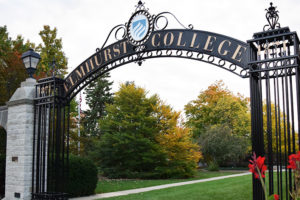
At MathFest, the annual summer meeting of the Mathematical Association of America, nothing speaks more loudly than numbers.
And among the most impressive figures to emerge from the conference in Madison, Wisconsin, were these: Three mathematicians from the College presented papers at the meeting: all three came home with national awards for outstanding presentations. For you non-math majors, that’s a 100 percent rate of success.
The three—junior Marissa Clougher, senior Sarah Wesley and 2012 graduate Candice Nielsen—were among only 10 winners of Pi Mu Epsilon Student Speaker Awards given at the conference.
The clean sweep was no surprise to the students’ math professor, Jon Johnson. He knew the students’ work was first rate; just as importantly, he said, they had worked hard to master the art of presenting difficult concepts to sometimes perplexed audiences.
“Presenting can be a daunting task,” Johnson said. But it’s one all Elmhurst math majors tackle. They are required not only to write a senior paper, but to present it to their fellow students. “It’s an important skill and an important experience. You gain confidence in your ability to explain your work.”
The Elmhurst students who won awards at MathFest spent weeks polishing their presentations. It’s not hard to understand why. They knew the stakes would be raised at MathFest, with awards on the line and professors from around the country in the audience.
“I’ve never been afraid of presenting in front of my peers, but doing this in front of professors was different,” Wesley said. “I think I gave an awesome presentation because I had an excellent adviser.”
Johnson spent much of the summer overseeing the projects of Wesley and Clougher, who had earned Elmhurst College Faculty-Student Summer Collaborative Grants to work on topics in number theory, a field of mathematics. (Nielsen’s project, in which she discovered and proved two theorems in geometry related to vertex polygon, grew out of her senior paper.)
Johnson and his students spent part of the summer working in a second-floor conference room in Daniels Hall that came equipped with a low-tech but crucial resource: three large chalkboards on which the students could scrawl out long strings of numbers in their search for solutions to problems.
“There were many days when we filled every inch of those chalkboards,” Johnson said.
The projects Wesley and Clougher worked on had in common an interest in Niven numbers. A Niven number is one that is divisible by the sum of its digits. For example, 42 is a Niven number because the sum of its digits, 6, evenly divides 42. But 32 is not a Niven number, because 5 does not evenly divide 32.
Clougher’s paper suggested a way of generating what she called universal Niven numbers—that is, numbers that would have the qualities of Niven numbers not only in the familiar base-10, but in any standard base. Wesley’s paper identified a way of producing chains of Niven numbers that could be used in cryptography.
Nielsen is now pursuing a Ph.D. in math at Northern Illinois University. Wesley is completing her secondary education certification and plans to teach scholastic math. Clougher plans to become an actuary and has already passed one of the Society of Actuary examinations.
It didn’t escape Wesley’s notice that, in a field where men traditionally outnumber women, Elmhurst’s award-winning MathFest presenters were all female. According to the U.S. Department of Commerce, women hold fewer than 25 percent of jobs in science, technology, engineering and math (or STEM) fields. But at MathFest, Wesley said, more than half of the participants in some sessions were women.
“We’re catching up,” she said. “Watch out.”